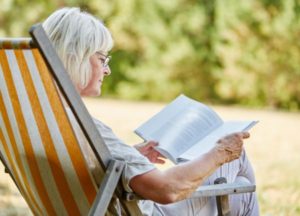Soak up the Sun? Getting Vitamin D and Saving Your Skin

It’s June in Kansas, so that means temps in the mid-80s and sunny skies. It can be tempting to want to bask in the sun’s rays. After all, a little bit of sun is good for us, right? Well, that all depends.
Benefits of Vitamin D
Our bodies need Vitamin D, which we get from the sun, to help absorb calcium. The “sunshine vitamin” helps with bone health, boosts our immune systems and can have other benefits as well.
Low vitamin D levels have been connected with osteoporosis, muscle weakness, cancer and rickets, according to medical experts.
We know that Vitamin D comes from the sun and that we need it for our bones to stay strong. The CDC even recommends spending time outside to improve health and wellbeing and reduce stress. However, they point out that too much exposure to the sun could put you at risk for skin cancer.
Dangers of Too Much Sun
Skin cancer is the most common form of cancer in the US. And according to the American Cancer Society, about 5.4 million skin cancers are diagnosed each year.
“The number of these cancers has been increasing for many years. This is probably from a combination of better skin cancer detection, people getting more sun exposure, and people living longer,” said the American Cancer Society website.
Too much sun can also age skin faster and cause eye damage to the retina, sunburns and heat stroke.
Sun Safety
Most skin cancers come from ultraviolent or UV light. Those UV rays come from the sun year round. So even on cloudy days, it’s important to protect your skin.
Look for broad spectrum sunscreen, which will protect you from both UVA and UVB rays with SPF 30 or higher. When looking at SPF, the higher the number, the higher the protection. The CDC reminds you to reapply after two hours, as sunscreen wears off. And don’t forget all areas of exposed skin like hands, backs, ears and feet.
Sunglasses that block both UVA and UVB rays help reduce your risk of cataracts and protect the skin around your eyes.
Remember that from 10 a.m. to 4 p.m., UV rays are the strongest. Keep an eye on the UV index to see how strong the exposure is for the day.
Lastly, seek shade. Avoid direct sun by lounging under an umbrella or large tree.
Finding a Happy Balance
So how do we safely get vitamin D if we need to avoid the sun?
“Just being outdoors you get a fair amount of sun exposure and some sun-related generation of vitamin D,” said Dr. Karl Insogna, Endocrinologist at the Yale School of Medicine. “It’s best to use sunblock when outdoors in strong sunlight for any prolonged length of time. Because this may limit the amount of vitamin D you get from sun exposure, make sure your diet includes sources of vitamin D from foods or supplements.”
Foods that provide Vitamin D include fish like salmon, mackerel and tuna, fortified milk, yogurt, orange juice and tofu, and egg yolks.
Supplements are another option. “These are generally recommended for people with lactose intolerance, milk allergies, as well as for people with darker skin tones or with certain medical conditions that prevent them from going outdoors,” according to the Yale School of Medicine.
About Advena Living
At Advena Living, we encourage residents to get outside and get fresh air. However, we want residents to be safe. We’re mindful of all extreme temperatures and shaded areas for relief.
Advena Living specializes in skilled nursing, rehabilitation and long-term care throughout seven locations in Kansas. Two of our locations offer assisted living as well.
Our name “Advena” means newcomer. We welcome newcomers seeking a senior living environment where they may continue to enjoy a full life.



















